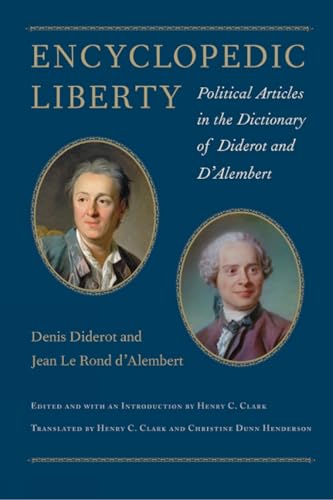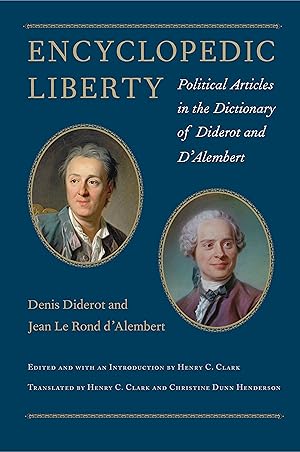diderot denis dalembert jean clark (17 résultats)
CommentairesFiltres de recherche
Type d'article
- Tous les types de produits
- Livres (17)
- Magazines & Périodiques (Aucun autre résultat ne correspond à ces critères)
- Bandes dessinées (Aucun autre résultat ne correspond à ces critères)
- Partitions de musique (Aucun autre résultat ne correspond à ces critères)
- Art, Affiches et Gravures (Aucun autre résultat ne correspond à ces critères)
- Photographies (Aucun autre résultat ne correspond à ces critères)
- Cartes (Aucun autre résultat ne correspond à ces critères)
- Manuscrits & Papiers anciens (Aucun autre résultat ne correspond à ces critères)
Etat En savoir plus
- Neuf (13)
- Comme neuf, Très bon ou Bon (3)
- Assez bon ou satisfaisant (1)
- Moyen ou mauvais (Aucun autre résultat ne correspond à ces critères)
- Conformément à la description (Aucun autre résultat ne correspond à ces critères)
Reliure
- Toutes
- Couverture rigide (17)
- Couverture souple (Aucun autre résultat ne correspond à ces critères)
Particularités
- Ed. originale (Aucun autre résultat ne correspond à ces critères)
- Signé (Aucun autre résultat ne correspond à ces critères)
- Jaquette (Aucun autre résultat ne correspond à ces critères)
- Avec images (9)
- Sans impressions à la demande (17)
Langue (1)
Prix
- Tous les prix
- Moins de EUR 20 (Aucun autre résultat ne correspond à ces critères)
- EUR 20 à EUR 45
- Plus de EUR 45
Livraison gratuite
Pays
Evaluation du vendeur
-
Encyclopedic Liberty: Political Articles in the Dictionary of Diderot and d'Alembert
Vendeur : ThriftBooks-Dallas, Dallas, TX, Etats-Unis
EUR 20,62
Autre deviseGratuit expédition vers Etats-UnisQuantité disponible : 1 disponible(s)
Ajouter au panierHardcover. Etat : As New. No Jacket. Pages are clean and are not marred by notes or folds of any kind. ~ ThriftBooks: Read More, Spend Less 3.45.
-
EUR 20,63
Autre deviseEUR 3,37 expédition vers Etats-UnisQuantité disponible : 1 disponible(s)
Ajouter au panierhardcover. Etat : Good. This is a used book in good condition and may show some signs of use or wear . This is a used book in good condition and may show some signs of use or wear .
-
Encyclopedic Liberty : Political Articles from the Dictionary of Diderot and D'alembert
Vendeur : GreatBookPrices, Columbia, MD, Etats-Unis
EUR 26,08
Autre deviseEUR 2,25 expédition vers Etats-UnisQuantité disponible : 4 disponible(s)
Ajouter au panierEtat : New.
-
EUR 20,52
Autre deviseEUR 7,65 expédition vers Etats-UnisQuantité disponible : 3 disponible(s)
Ajouter au panierEtat : New. SUPER FAST SHIPPING.
-
Encyclopedic Liberty : Political Articles from the Dictionary of Diderot and D'alembert
Vendeur : GreatBookPrices, Columbia, MD, Etats-Unis
EUR 27,75
Autre deviseEUR 2,25 expédition vers Etats-UnisQuantité disponible : 4 disponible(s)
Ajouter au panierEtat : As New. Unread book in perfect condition.
-
EUR 31,96
Autre deviseEUR 7,47 expédition depuis Royaume-Uni vers Etats-UnisQuantité disponible : 3 disponible(s)
Ajouter au panierEtat : New. pp. 496.
-
EUR 41,19
Autre deviseGratuit expédition vers Etats-UnisQuantité disponible : Plus de 20 disponibles
Ajouter au panierHardback. Etat : New. Often described as the culmination of the French Enlightenment, the Encyclopédie was collected to not only serve as a comprehensive reference work, but to "change the way men think" about every aspect of the human and natural worlds. In his celebrated "Preliminary Discourse" to the compilation, d'Alembert traced an entire history of modern philosophy and science designed to chart the way toward a sweeping Baconian project of improving the world through usable knowledge. This anthology is the first endeavor to bring together the most significant political writing from the entire twenty-million-word compendium. It includes eighty-one of the most original, controversial and representative articles on political ideas, practices, and institutions, many translated into English for the first time. The articles cover such topics as the foundations of political order, the relationship between natural and civil liberty, the different types of constitutional regimes, the role of the state in economic and religious affairs, and the boundaries between manners, morals, and laws. In addition to Diderot's early and important articles "Political Authority," the "Citizen," and "Natural Right" and the substantial treatments of subjects such as the "Legislator" (by Saint-Lambert), "Representation" (by d'Holbach), "Population" (by Damilaville), and "Political Economy" (by Quesnay), the anthology will also introduce to many English-language readers the tireless figure of Chevalier Louis de Jaucourt (170480), who wrote about 18,000 articles, or about 25 percent of the Encyclopédie. Jaucourt's numerous articles on political topics did much to solidify the new political teachings of the natural-law tradition, the English Whig writers, the Huguenot diaspora, and particularly Montesquieu, whose Spirit of the Laws had appeared shortly before the first volume of the Encyclopédie itself.
-
EUR 35,66
Autre deviseEUR 8,95 expédition vers Etats-UnisQuantité disponible : 2 disponible(s)
Ajouter au panierEtat : New. Num Pages: 832 pages. BIC Classification: HPCD1. Category: (UP) Postgraduate, Research & Scholarly; (UU) Undergraduate. Dimension: 169 x 239 x 67. Weight in Grams: 1470. . 2016. Hardback. . . . . Books ship from the US and Ireland.
-
EUR 34,35
Autre deviseEUR 10,50 expédition depuis Irlande vers Etats-UnisQuantité disponible : 2 disponible(s)
Ajouter au panierEtat : New. Num Pages: 832 pages. BIC Classification: HPCD1. Category: (UP) Postgraduate, Research & Scholarly; (UU) Undergraduate. Dimension: 169 x 239 x 67. Weight in Grams: 1470. . 2016. Hardback. . . . .
-
EUR 47,32
Autre deviseGratuit expédition depuis Royaume-Uni vers Etats-UnisQuantité disponible : 2 disponible(s)
Ajouter au panierHardback. Etat : New. Often described as the culmination of the French Enlightenment, the Encyclopédie was collected to not only serve as a comprehensive reference work, but to "change the way men think" about every aspect of the human and natural worlds. In his celebrated "Preliminary Discourse" to the compilation, d'Alembert traced an entire history of modern philosophy and science designed to chart the way toward a sweeping Baconian project of improving the world through usable knowledge. This anthology is the first endeavor to bring together the most significant political writing from the entire twenty-million-word compendium. It includes eighty-one of the most original, controversial and representative articles on political ideas, practices, and institutions, many translated into English for the first time. The articles cover such topics as the foundations of political order, the relationship between natural and civil liberty, the different types of constitutional regimes, the role of the state in economic and religious affairs, and the boundaries between manners, morals, and laws. In addition to Diderot's early and important articles "Political Authority," the "Citizen," and "Natural Right" and the substantial treatments of subjects such as the "Legislator" (by Saint-Lambert), "Representation" (by d'Holbach), "Population" (by Damilaville), and "Political Economy" (by Quesnay), the anthology will also introduce to many English-language readers the tireless figure of Chevalier Louis de Jaucourt (170480), who wrote about 18,000 articles, or about 25 percent of the Encyclopédie. Jaucourt's numerous articles on political topics did much to solidify the new political teachings of the natural-law tradition, the English Whig writers, the Huguenot diaspora, and particularly Montesquieu, whose Spirit of the Laws had appeared shortly before the first volume of the Encyclopédie itself.
-
Encyclopedic Liberty : Political Articles from the Dictionary of Diderot and D'alembert
Vendeur : GreatBookPricesUK, Woodford Green, Royaume-Uni
EUR 36,86
Autre deviseEUR 17,23 expédition depuis Royaume-Uni vers Etats-UnisQuantité disponible : 4 disponible(s)
Ajouter au panierEtat : New.
-
EUR 51,33
Autre deviseEUR 3,40 expédition vers Etats-UnisQuantité disponible : 3 disponible(s)
Ajouter au panierEtat : New. pp. 496.
-
EUR 46,53
Autre deviseEUR 9,95 expédition depuis Allemagne vers Etats-UnisQuantité disponible : 3 disponible(s)
Ajouter au panierEtat : New. pp. 496.
-
Encyclopedic Liberty : Political Articles from the Dictionary of Diderot and D'alembert
Vendeur : GreatBookPricesUK, Woodford Green, Royaume-Uni
EUR 48,91
Autre deviseEUR 17,23 expédition depuis Royaume-Uni vers Etats-UnisQuantité disponible : 4 disponible(s)
Ajouter au panierEtat : As New. Unread book in perfect condition.
-
EUR 32,27
Autre deviseEUR 48,99 expédition depuis Allemagne vers Etats-UnisQuantité disponible : 4 disponible(s)
Ajouter au panierGebunden. Etat : New. KlappentextOften described as the culmination of the French Enlightenment, the Encyclopédie was collected to not only serve as a comprehensive reference work, but to "change the way men think" about every aspect of the h.
-
EUR 42,99
Autre deviseEUR 42,61 expédition vers Etats-UnisQuantité disponible : Plus de 20 disponibles
Ajouter au panierHardback. Etat : New. Often described as the culmination of the French Enlightenment, the Encyclopédie was collected to not only serve as a comprehensive reference work, but to "change the way men think" about every aspect of the human and natural worlds. In his celebrated "Preliminary Discourse" to the compilation, d'Alembert traced an entire history of modern philosophy and science designed to chart the way toward a sweeping Baconian project of improving the world through usable knowledge. This anthology is the first endeavor to bring together the most significant political writing from the entire twenty-million-word compendium. It includes eighty-one of the most original, controversial and representative articles on political ideas, practices, and institutions, many translated into English for the first time. The articles cover such topics as the foundations of political order, the relationship between natural and civil liberty, the different types of constitutional regimes, the role of the state in economic and religious affairs, and the boundaries between manners, morals, and laws. In addition to Diderot's early and important articles "Political Authority," the "Citizen," and "Natural Right" and the substantial treatments of subjects such as the "Legislator" (by Saint-Lambert), "Representation" (by d'Holbach), "Population" (by Damilaville), and "Political Economy" (by Quesnay), the anthology will also introduce to many English-language readers the tireless figure of Chevalier Louis de Jaucourt (170480), who wrote about 18,000 articles, or about 25 percent of the Encyclopédie. Jaucourt's numerous articles on political topics did much to solidify the new political teachings of the natural-law tradition, the English Whig writers, the Huguenot diaspora, and particularly Montesquieu, whose Spirit of the Laws had appeared shortly before the first volume of the Encyclopédie itself.
-
EUR 43,39
Autre deviseEUR 74,67 expédition depuis Royaume-Uni vers Etats-UnisQuantité disponible : 2 disponible(s)
Ajouter au panierHardback. Etat : New. Often described as the culmination of the French Enlightenment, the Encyclopédie was collected to not only serve as a comprehensive reference work, but to "change the way men think" about every aspect of the human and natural worlds. In his celebrated "Preliminary Discourse" to the compilation, d'Alembert traced an entire history of modern philosophy and science designed to chart the way toward a sweeping Baconian project of improving the world through usable knowledge. This anthology is the first endeavor to bring together the most significant political writing from the entire twenty-million-word compendium. It includes eighty-one of the most original, controversial and representative articles on political ideas, practices, and institutions, many translated into English for the first time. The articles cover such topics as the foundations of political order, the relationship between natural and civil liberty, the different types of constitutional regimes, the role of the state in economic and religious affairs, and the boundaries between manners, morals, and laws. In addition to Diderot's early and important articles "Political Authority," the "Citizen," and "Natural Right" and the substantial treatments of subjects such as the "Legislator" (by Saint-Lambert), "Representation" (by d'Holbach), "Population" (by Damilaville), and "Political Economy" (by Quesnay), the anthology will also introduce to many English-language readers the tireless figure of Chevalier Louis de Jaucourt (170480), who wrote about 18,000 articles, or about 25 percent of the Encyclopédie. Jaucourt's numerous articles on political topics did much to solidify the new political teachings of the natural-law tradition, the English Whig writers, the Huguenot diaspora, and particularly Montesquieu, whose Spirit of the Laws had appeared shortly before the first volume of the Encyclopédie itself.











